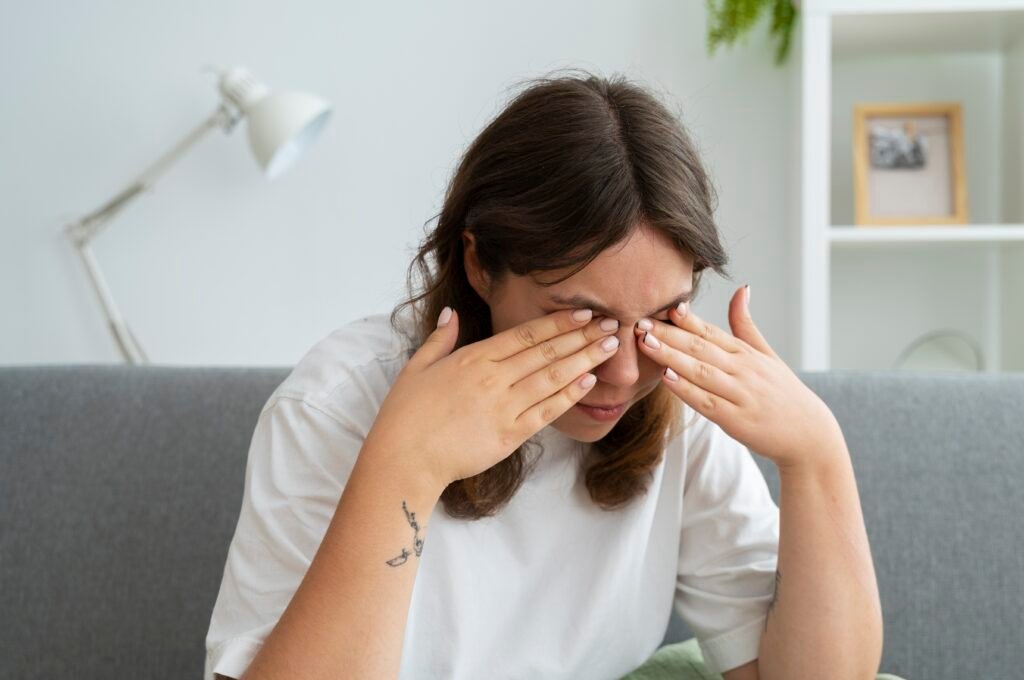Conjunctivitis (Pink Eye)
Eye irritation or conjunctivitis is a well-known problem. Eye problems usually resolve within a few weeks without any special treatment. However, in some cases, it is necessary to consult a doctor. This problem can spread quickly from one person to another. Therefore, knowing simple and effective ways to prevent eye irritation is important.
Signs and Symptoms
The most common symptom is a red or pink eye. Other symptoms include:
- Swollen eyelids
- Swelling of the thin transparent membrane over the white part of the eye
- Burning, itching, and redness of the eyes
- Watery eyes
- A buildup of mucus or pus in the eye. The pus becomes sticky on drying, and the eyelids or eyelashes may get temporarily twisted. This is especially true after waking up in the morning. If you have these symptoms, your eyes are swollen.
Causes of Conjunctivitis
It is very difficult to find out the real reason behind it. Although there are many different causes, most of the symptoms are the same. Bacteria and viruses are usually the cause of eye infections. And sometimes it’s caused by an allergy. The disease is more prevalent during the wet season.
Home Remedies for Conjunctivitis
Because the eye swelling recovers on its own within a few weeks without any special treatment, a few simple home remedies can help you get rid of the symptoms.
You can apply cold water to your eyes. This will reduce irritation and redness of the eyes. For this, keep a light cold flannel cloth gently on the eyes for a few minutes. It cools the eyes and helps to relax.
Boil the water and strain it to clean your eyes. Soak a clean cloth in water and wipe your eyes with it. In this way, the pus and dirt accumulated in the eyes can be easily cleaned. A separate cloth should be used for each eye so that the germs of one eye do not spread to the other eye. You can also use cotton pads instead of cloth pieces.
Do not use contact lenses in the eye until the eye is completely healed. In this case, consult a doctor.
When to Go to the Doctor
Eye problems are usually treated at home. However, if you have any of the following symptoms, you should immediately consult a doctor:
- Pain in the eye
- The eyes are sensitive to light. Problems with the eyes, such as light or sunlight
- Blinking eyes, blurred vision, or blurred vision
- Blurred vision and blurred vision even after cleaning the eyes
- A rash or swelling on the body
- Severe redness in one or both eyes
- Bacterial conjunctivitis that does not show improvement even after 24 hours of using antibiotics.
- No improvement or worsening of symptoms over time. Symptoms persist beyond two weeks
- After wearing contact lenses, the symptoms of eye irritation appear. Also, there are spots on the eyelids. This may be due to an allergic reaction to the lens.
This could potentially signal a more serious issue with your eyes. Therefore, you should immediately consult a doctor. A doctor should also be consulted for general eye problems, especially in people with weakened immune systems.
This could potentially signal a more serious issue with your eyes
How Pink Eye Spreads
– Direct contact with the infected person, for example, touch and handshake
– Through the air from the infected person’s sneeze
– Close proximity to the infected person
– After touching anything infected with germs, do not wash your hands, for example, doorknobs, books, tissues, or eye-wash
A healthy person’s eyes are not affected by looking into the eyes of an infected person. This is a completely unscientific idea. However, some bacteria and viruses can cause eye infections. In such a case, a healthy person can be infected from the infected person by touching or sneezing or staying very close to the infected person.
Prevention of Conjunctivitis
Conjunctivitis can easily spread from an infected person to a healthy person. However, there are some simple ways to prevent it from spreading.
- Wash your hands regularly. Wash your hands regularly with warm water and soap for at least 30 seconds. It is especially important to wash hands before eating, before and after applying eye drops or ointments, and after cleaning the eyes. Also, wash your hands with soap and warm water after touching an infected person’s belongings (such as a handkerchief, cloth, or bed sheet) and after putting medicine in the eyes of the infected person or child.
- Cover your mouth while sneezing. Use a tissue or handkerchief to cover your mouth when coughing or sneezing. After use, the tissue should be disposed of in a dustbin. Wash it off with soap or detergent. Afterwards, thoroughly wash your hands using soap and water
- Cleanse the eyes. If any water or pus comes out of the eyes, wipe it with a clean wet cloth or cotton a few times a day. Wash your hands before touching your eyes. After cleaning the eyes, the used cotton should be discarded. Additionally, ensure to wash your hands thoroughly using soap and warm water.
- Cleaning used clothes. Wash pillow covers, bed sheets, towels, and face coverings (such as handkerchiefs, and masks) regularly with soap or detergent and warm water. After this, wash your hands thoroughly.
- Keep glasses and utensils clean. If you need to use glasses, clean them. Be sure to clean your glasses, eyeglasses, or any other items you use (such as towels and handkerchiefs) and use them carefully, so that no one else uses the same items.
- Keeping the contact lenses clean. If the doctor advises continuing to use contact lenses, clean and store the contact lenses as per the advice of the eye doctor. Also, replace the old lens with a new one.

